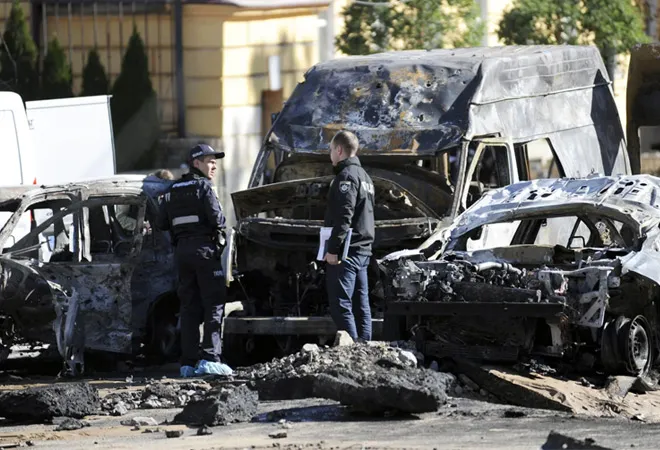-
CENTRES
Progammes & Centres
Location
The tide of the war has turned against Moscow. But the Russian president and his close advisers do not acknowledge that reality and have resorted to nuclear sabre rattling

Leaders often start wars in hubris, thinking that they would shape the course of the conflict. But it is the fog of war that, more often than not, ends up becoming the more significant determinant. Russian President Vladimir Putin is facing a similar predicament. Despite the reality on the ground, he continues to insist that the situation will soon be under control. Last week, he said he expected the situation to “stabilise” in Ukrainian regions annexed by the Kremlin despite his forces suffering military setbacks and losing several key towns to Kyiv. This was followed by heavy bombing in the southern Ukrainian city of Zaporizhzhia — the capital of one of the regions annexed by Russia – and then the raining of missiles across the vast Ukrainian territory from Kyiv and Lviv to Kharkiv and Odessa.
That the Ukraine conflict is becoming a disaster for Putin would be an understatement. Only Putin and his core group of acolytes, it seems, remain confident of turning the tide around in their favour. Even the chairman of the defence committee of the lower house of the Russian parliament recently suggested that Russia needed to stop lying about what was going on on the battlefield. His words that “our people are not stupid,” underline a growing disconnect between the ruler and the ruled in Putin’s Russia. The battlefield losses of Russia are a wartime reality not merely western propaganda. Today, Russia, a once formidable military power, is struggling hard to protect its image of a nation under control. Images of Russian troops retreating in disarray from Ukraine are haunting Russians and a large majority of them, fed on the idea of Russia recovering its global image, are witnessing the decline of their great nation in real time. For any nation, this can be a painful process but for Russia which had only its military instrument to underscore its claim to a major power status, it is all the more striking to have it shown its place by Ukraine, a nation that Putin doesn’t even consider worthy of a separate national identity. The hardliners have voiced criticism that perhaps Putin is exhibiting weakness. Russian ultra-nationalists are bemoaning Putin’s reluctance to go all out in putting Ukraine in its place and the recent bombings were more about managing domestic public opinion than a strategic response to unfolding battlefield realities. The announcement to go for a partial mobilisation to raise as many as 300,000 soldiers in the face of personnel shortage has triggered angry protests, with more than 7,00,000 people reportedly fleeing Russia in recent weeks to avoid being drafted into the army. Putin has little control over the state of affairs. Therefore, it is unsurprising that Putin and his supporters have resorted to nuclear sabre rattling to stave off a gargantuan humiliation. His angry bluster puts Russia in the league of nations like Pakistan and North Korea — certainly not a comparison most Russians would approve of.The Russian military never really had full control over these territories and now the Ukrainian forces are making it clear that they remain capable and willing to push through in areas held by Russia.
For India, which has been an old and supportive friend of Russia for decades, this is a particularly troubling time. It is almost heartbreaking to see the callousness with which Russia first created and then has been handling the Ukraine crisis. While a reasonable argument can be made about Russia’s desire for a better geopolitical balance in Eurasia, it is very difficult to agree with the path Moscow has chosen to achieve its objectives. New Delhi needs a Moscow that is capable of highlighting the inequities in the global balance of power and is willing to stand up for a multipolar world. But a Russia that is interested in showcasing its brutal force vis-à-vis its weaker neighbours and instead of playing its global role as a responsible nuclear power is casually throwing nuclear threats around cannot really be a long-term partner. Prime Minister Narendra Modi is right in openly expressing India’s concerns with Putin but Moscow must also understand that the image of Russia as a global power of some reckoning is coming undone every single day with the course and conduct of its war with Ukraine. A war waged without clear strategic objectives and a political game plan ends up making the nation a prisoner of her own ambitions. Despite all his bravado, Putin has fallen into that trap and is struggling to get out. As strategic, operational and even tactical gains go beyond his reach, Putin’s desperation is showing. He might be tempted to escalate it in a manner that may do great damage to Ukraine and Europe but that escalation would also be the final nail in the coffin of his political future. New Delhi has made it clear that it is on the side of peace. It is Moscow that has to decide if it really has a plan for peace or if nihilism is the only way left for it now.Prime Minister Narendra Modi is right in openly expressing India’s concerns with Putin but Moscow must also understand that the image of Russia as a global power of some reckoning is coming undone every single day with the course and conduct of its war with Ukraine.
The views expressed above belong to the author(s). ORF research and analyses now available on Telegram! Click here to access our curated content — blogs, longforms and interviews.

Professor Harsh V. Pant is Vice President – Studies and Foreign Policy at Observer Research Foundation, New Delhi. He is a Professor of International Relations ...
Read More +